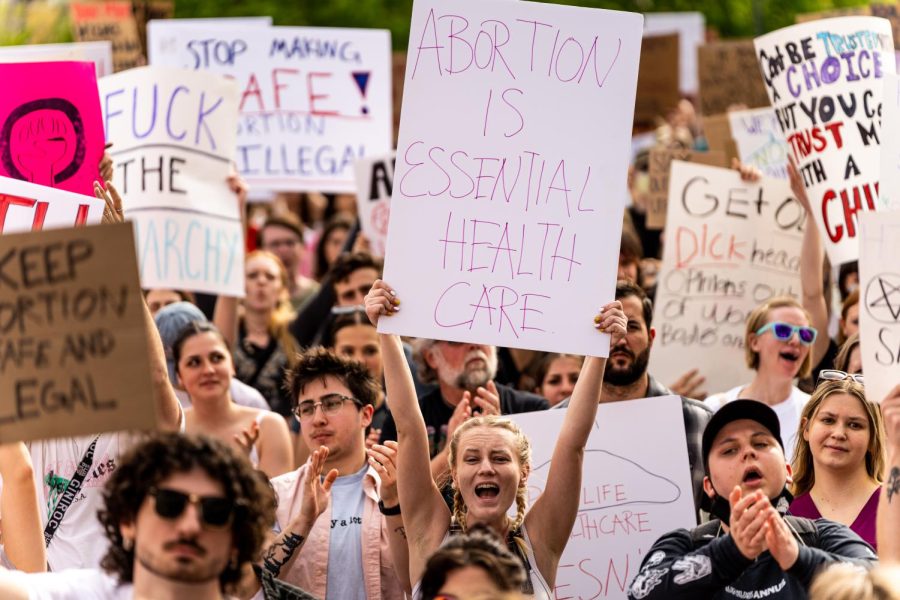Lezaic: Stop Celebrity Worship Culture
May 24, 2022
This year we witnessed the popularly anticipated Met Gala trending right alongside Roe v Wade. As people reeled from the possibility of the government taking away bodily autonomy, images of celebrities in luxurious clothing circulated the Internet. Ironically enough, the Gilded Era — the inspiration for the 2022 Met Gala theme — was notorious for the same wealth inequality we see now.
At last year’s Met Gala, police in riot gear arrested Black Lives Matter protesters. Right next to the protest, a crowd waited to catch a glimpse of celebrities who paid $35,000 to attend the taxpayer-subsidized event. Worse yet, some crowd members blamed protesters for not getting to see their favorite celebrities. The culture of celebrity worship is dangerous. By tracking Hollywood’s moves so closely, we view real people as commodities and distract ourselves from real issues.
Though some scientists explain our obsession with celebrities as a form of empathy, it often goes too far and devolves into crude commentary and jokes. For many people, these jokes offer them a chance to talk about something other than the harsh reality of their own lives. These parasocial relationships lead us to expend time, energy and money on people who don’t know nor care that we exist. We waste our limited attention on topics everyone forgets about in a week when they stop trending on Twitter. When we consume the celebrity gossip that the media spoon-feeds us, we forget why our lives are a harsh reality in the first place.
The harm of celebrity culture goes beyond wasting time. The attention we invest in the world of celebrities results in dark and twisted realities. We make fan-cam edits of the Johnny Depp and Amber Heard trial as if their domestic abuse case is a sports game. We throw themed watch parties for weddings of the royal family, who are the very emblem of colonialism. We even flock to theaters to watch Marvel movies, which embody fascist U.S. military propaganda hiding behind the faces of Chris Evans and Robert Downey Jr.
Sometimes celebrities themselves participate in celebrity worship culture. Kim Kardashian promoted starvation to little girls while wearing Marilyn Monroe’s dress. Earlier in the pandemic, celebrities received backlash for singing “Imagine” by John Lennon, which they claimed would bring hope to the public. Meanwhile, celebrities continued hosting exorbitant parties to celebrate themselves, ignoring social distancing procedures completely.
Because of celebrity culture obsessions, we are subconsciously consuming dangerous and toxic messages all the time. We aspire to live their unattainable lives of luxury and romanticize their problems. But the temporary distraction that celebrity worship provides can worsen our health, possibly leading to “depression, anxiety, and a decrease in self-esteem.”
We can’t blame individuals for wanting this sense of connection, as the need is natural. We all participate in potentially harmful habits, but in order to organize ourselves as a working class, we need to tear the wool off our eyes. Not only do celebrities act as agents of distraction, but they exploit us for their own profit and then tell us to work harder. At the same time, they expect us to view their lives as relatable. There is nothing relatable about the way they contribute to the class divide. There is nothing relatable about the mansions they call jails, while incarcerated people face the actual conditions of jail or while workers globally struggle to keep a roof over their heads. There is nothing relatable about sitting in a rose-petal-filled bathtub and calling COVID-19 the “great equalizer” when people of color, disabled people and working-class people experience the brunt of the virus’s impact.
If we do talk about celebrities, it should be about larger themes in society. Like how quickly white people jumped at the chance to give unsolicited input on the Will Smith and Chris Rock situation. Or when people rallied behind Britney Spears to end her conservatorship. But the conversation shouldn’t end with one celebrity. Spears’ conservatorship was also a disability rights issue and should be treated as such. Many issues that celebrities face are ones that regular people experience but with much fewer resources.
Fans display impressive organizing power, but it happens alongside promotion of celebrities and ties back to celebrity worship. While we all resort to escapism in one way or another, we need to pull ourselves together and stop wasting our time on celebrity culture.








